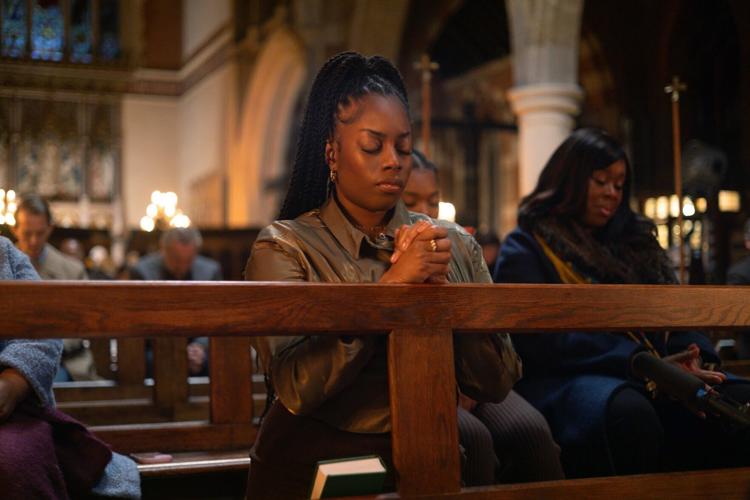
Candice Carty-Williams is the author and showrunner of "Queenie," a new Onyx Collective series on Hulu.┬Ā
Candice Carty-Williams borrowed ŌĆ£Bridget JonesŌĆÖs DiaryŌĆØ from her auntŌĆÖs bookshelf ŌĆ£when I was too young.ŌĆØ
She saw the film versions when she was older and realized she, too, wanted to make something similar.
The rub? Bridget Jones is white; Renee Zellweger is white, Candice Carty-Williams is not.
ŌĆ£But thatŌĆÖs OK,ŌĆØ Carty-Williams says. ŌĆ£These stories ŌĆö these facets of womanhood ŌĆö are universal, across race.ŌĆØ
To make her story resonate with others, Carty-Williams wrote about a 25-year-old Jamaican British woman living in South London. Called ŌĆ£Queenie,ŌĆØ the book was a bestseller, establishing its author and leading to a series set to premiere in June on Hulu.
In the showŌĆÖs mix: Carty-Williams, whoŌĆÖs not only the creator and executive producer but also the showrunner.
People are also reading…
ŌĆ£It was really important to me to be involved from the beginning to the end,ŌĆØ she says. ŌĆ£IŌĆÖm incredibly exacting as a person and every single decision I had to be a part of.ŌĆØ

Dionne Brown stars as Queenie, a 25-year-old Jamaican British woman living in south London, straddling two cultures and slotting neatly into neither. The series "Queenie" airs on Hulu.┬Ā
Most important: Authenticity.
To make sure ŌĆ£QueenieŌĆØ looked like the life she wrote about, Carty-Williams shot the series on location.
ŌĆ£Every single place was a location. Queenie and TomŌĆÖs flat ŌĆō that was one location. KyazikeŌĆÖs flat, that was another. We really wanted to be true to the location of the book and the world.ŌĆØ
The series allowed her to use voiceovers to bridge gaps, listen in on inner voices and take leaps other forms of storytelling couldnŌĆÖt.
ŌĆ£It made me nervous,ŌĆØ says Dionne Brown, who plays Queenie. ŌĆ£IŌĆÖm reacting to dialogue that nobody can hear.ŌĆØ
On the surface, Queenie may look happy, but sheŌĆÖs often revisiting trauma that happened to her.
ŌĆ£I didnŌĆÖt want to show domestic abuse or anything that was too heavy because I donŌĆÖt want to see that as a Black woman,ŌĆØ Carty-Williams explains. ŌĆ£It was important for me to use this fragmented way of showing things.ŌĆØ Music also helped.
ŌĆ£WeŌĆÖre seeing what happens when you stuff the drawer and you donŌĆÖt clear it out,ŌĆØ Brown says. ŌĆ£WeŌĆÖve all had a conversation with someone and we hear something that wasnŌĆÖt said. As a talking point now for me, IŌĆÖm more inclined to be like, ŌĆśTell me what youŌĆÖre thinking I saidŌĆÖ when thereŌĆÖs a misunderstanding. (Queenie) absorbs everything and she holds it at her center.ŌĆØ
Growing up, Carty-Williams watched depictions of Black women that were mainly American ŌĆ£and I remember trying to find myself in these depictions," she said. "They were really confident and understood themselves or were in spaces where their Blackness was often celebrated. I didnŌĆÖt feel that in the U.K., so I was like, ŌĆśMaybe itŌĆÖs time to write the story of someone who wasnŌĆÖt that confident.ŌĆÖŌĆØ

Queenie (Dionne Brown, center) and her friend Kyazike (Bella, left) maneuver life in London in "Queenie."┬Ā
Brown says the shift allowed ŌĆ£QueenieŌĆØ to celebrate the wins but also show the growth in losses.
ŌĆ£ThatŌĆÖs super important,ŌĆØ she says. ŌĆ£It also focuses on what that means in terms of mental health, womanhood, relationships and love and how we perceive it. The whole thing is like one big question mark.ŌĆØ
Surprisingly, when Carty-Williams wanted advice about adapting her book, she didnŌĆÖt talk to another woman but screenwriter Jesse Armstrong.
ŌĆ£He sat me down and he was like, ŌĆśMake sure you write what you want to write,''' she said. "And I was like, ŌĆśYouŌĆÖre Jesse Armstrong, you can say that to me.ŌĆÖ There arenŌĆÖt many Black female authors from the U.K. who have done this, so I had to look to a white man for help.ŌĆØ













